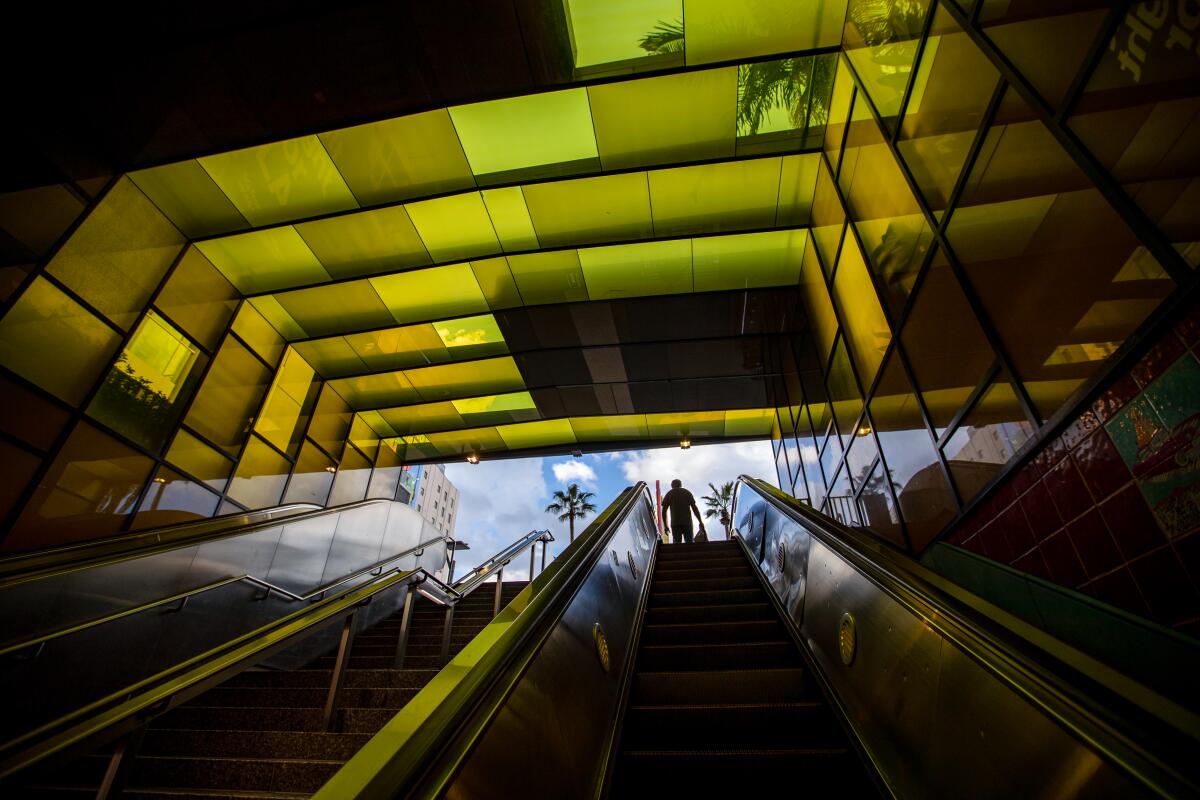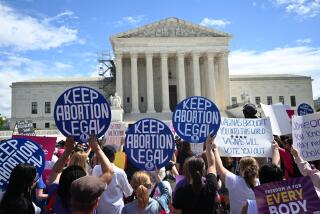Until Metro feels safer, many readers say they’re staying away from transit in L.A.

- Share via
As someone who was for years a daily transit rider and encouraged anyone and everyone to try L.A.’s buses and trains, I am pained to admit that, yes, using Metro has become a more unnerving experience since the start of the COVID-19 pandemic. That sad reality was reflected in Times reporter Rachel Uranga’s article offering a sobering view of the declining ridership, drug overdoses and crime plaguing Metro trains and stations.
The Metro system isn’t only trains, however, and in my experience bus operations have been generally fine. The trains — especially the Red and Purple lines — are a different story, and Uranga’s report focused on them. Readers also expressed their fears riding Metro trains recently, though some wrote to say their experiences have been better than what was reported in The Times.
Still, the overarching message from them was that until taking transit in Los Angeles feels safer, they’re staying away from the system.
————
To the editor: My wife and I have been riding L.A.’s rail system since the Blue Line (now the A Line) began operations in 1990. Today, neither of us feels safe using the system.
Every time we ride, we witness some kind of forbidden activity — out-of-control people verbally and physically abusing other passengers, people playing their music at high volume, passengers walking through the train selling everything you can imagine and so on. Then, of course, there is the open use of drugs mentioned in your article.
No one checks for fare payment anymore, and police presence on the trains is almost nonexistent. An occasional pair of cops yapping to each other on a platform is not a crime deterrent on the trains.
Checking fare payment and having police presence on the trains are needed to curtail the madness and bring back ridership.
Kevin Sutlick, Long Beach
..
To the editor: In Los Angeles, where driving a car gives you a status that using public transportation does not, it is not fair to bad-mouth the Metro system.
While it is true that there are a number of undesirables accompanying me on my daily trips, other groups use the system daily. Students and tourists make up a large portion of the people who accompany me on my subway rides to my downtown L.A. gym as well as my neighborhood grocery store.
The “marginals” may be the dominant population on the train, but tourists as well as seniors like myself who no longer feel capable of dealing with the challenge of driving a car in L.A. are also an important part of the system.
Our future lies in public transportation. Let’s support the system and encourage people to use it. Yes, you have to keep your wits about you, but it’s far less challenging than negotiating the freeway.
Ruth Kramer Ziony, Los Feliz
..
To the editor: I moved to L.A. from Detroit in 2007 and was pleased with the prospects of public transit. I have ridden every mile of rail and plenty of buses.
Before the pandemic, I saw plenty of troubled people, of course, but lots of commuters too. Platforms and trains were crowded much of the time. But it’s changed badly since then.
Just last week, my daughter from Amsterdam was in town. One evening, she took the L Line (formerly the Gold Line) from Chinatown to Pasadena, and she was shaken to her core. She’s a season world traveler, but her experiencing riding the train here was beyond anything she’s previously known.
The system has failed. It’s a reflection, I fear, of much larger social issues that we as nation are too cowardly to address. Can the L.A. transit system recover? Not until commuters feel safe.
Tom Eggebeen, Pasadena
..
To the editor: I take the B Line (formerly the Red Line) to work three to four days a week. While I do see plenty of homeless people, I have only once seen open drug use and have never (thankfully) witnessed a crime.
To describe the Metro system as a space completely abandoned to criminals and drug users is to dismiss the thousands of people I ride the train with every day — working people, students and, yes, even tourists.
I’m sure I speak for all Metro riders when I say sure, I’d like to have a seat on the train instead of them being filled by “sleepers,” and I’d definitely like a cleaner experience. But I worry that articles like this will only make things worse by giving the impression that no one takes the subway, leading authorities to give up on improving it, further scaring away riders.
Lisa Butters-Smith, Valley Village
..
To the editor: As a longtime regular Metro train rider, I can confirm your article does not exaggerate. Metro has lost control over its train system. There is virtually no fare enforcement. Trains stink from the smell of drugs and humans. It is no surprise the public is abandoning Metro trains.
Here is an idea: One car from each train can be designated for freeloaders and drug users, like the smoking car of the past. Designate similar areas in train stations. Ambassadors could shepherd such individuals to the designated car or area. Everyone else could have a normal ride in the remaining train cars.
A wild idea? Sure. But a wilder idea would be for Metro to continue to surrender a transportation system that has cost taxpayers many billions of dollars.
Carla St. Romain, Pasadena
..
To the editor: Thank you for your front-page expose regarding the disturbing situation on our Metro subway system.
I’ve been taking the B Line late at night from Union Station, and it is a terrifying experience. On a train full of zombies from a post-apocalyptic horror film, I appear to be the only real “commuter” who pays with a TAP card.
Let’s hope this exposure will prompt officials to take back our transit system.
William Simpson, Silver Lake
..
To the editor: I was saddened but not surprised to read Rachel Uranga’s story about rampant drug use and disorder on Metro. As a (former) B Line rider, I can attest to the environment of danger and antisocial behavior that pervade the system.
Metro’s inability to offer a safe environment is part of a broader pattern of mismanagement and incompetence dating back decades. It includes frequent service cuts, delays, waste and over-budget, overdue expansion projects.
While Metro’s chief executive must share in the blame, the buck ultimately stops with the board of directors. The board is mostly composed of local elected officials, including the mayor of Los Angeles and county supervisors. Sadly, they have used Metro as a political football and jobs program, rather than treating it as a crucial public asset.
In any other world city, a fundamental breakdown of transit would be met with profuse apologies and resignations. However, Metro’s board appears incapable of introspection and shame.
The state government must intervene by appointing a new board of subject matter experts, not politicians. Only then will Metro stand a chance of becoming a safe, dependable, high-quality transportation system.
Anthony Dedousis, Los Angeles







